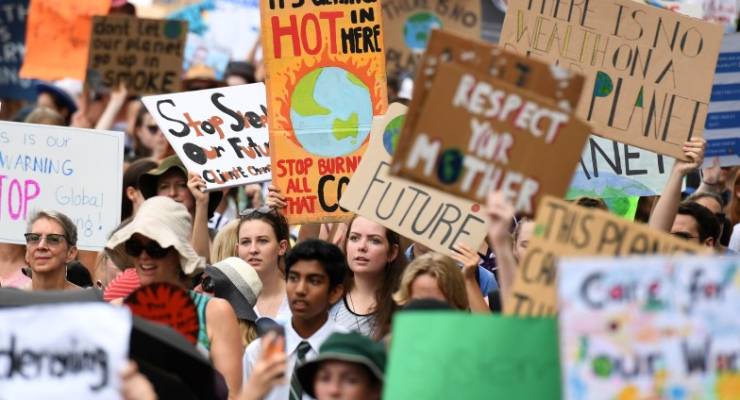
Just a month ago, G7 nations met in south-west France — with the raging forest fires in the Amazon near the top of the agenda. Despite stiff resistance from Brazil’s populist President Jair Bolsonaro, the other leaders demanded action in a region where temperatures have risen by 0.5 degrees celsius between 1985 and 2017. Despite all this, the fires are still burning and Brazil has suffered no consequences.
Last Friday, millions of mainly young people rallied in advance of this week’s climate summit at the United Nations in New York. However, a new poll in Australia suggests these large protests had little impact and changed few minds. An Essential poll, taken in advance of the protests and published Tuesday, showed just 6% of respondents said they would take part in the rallies, while 65% said they were unaware of them happening.
These findings support new research published this week by the Washington-based Brookings Institution, which looked at why the number of people “very concerned” about climate change remains stubbornly stuck at about 40%. While the percentage of those very concerned isn’t budging, the report showed that another number has been edging up — the proportion of the population believing “the seriousness of global warming is generally exaggerated”.
To back up these observations, Elaine Kamarck, the director of the Center for Effective Public Management at Brookings, also examined open-ended public opinion surveys conducted by Gallup between 1989 and 2019. In the last 3o years, Kamarck found that “environment” and “pollution” were only mentioned by 0.8% to 8% of respondents. According to Brookings’ most recent survey, only 3% of the public mentioned “the environment/pollution/climate change” as one of the most important issues currently faced.
“Given the severity of the climate crisis and the potential for existential damage to the human race and planet, the lack of intensity around the issue is simultaneously incomprehensible and totally understandable,” says Kamarck. “So let’s look at the latter. The explanations fall into at least four categories: complexity; jurisdiction and accountability; collective action and trust; and imagination.”
Here’s her potted explanation: complexity is the death knell of many modern public policy problems — and complexity is inherent in climate change. Jurisdiction is a problem, because it is hard to isolate who is responsible for what is happening across the globe: “In the absence of jurisdiction, everyone is accountable and therefore no one is accountable,” said Brookings.
Trust is a key reason why the number of people taking climate change seriously stubbornly remains at 40%. Democracies with strong individualist traditions — like the US and Australia — tend to have very low trust in government.
“The lack of trust in government … may be one of the foundational barriers to effective environmental action,” wrote Kamarck. “Writing in the journal Global Environmental Change, E. Keith Smith and Adam Mayer looked at 35 different countries. They found that a lack of trust in institutions blunts the public’s risk perceptions and therefore their willingness to support behaviours or policies to address climate change.”
So, if you don’t trust governments, you are sceptical about that government telling you what you need to do to counter climate change — especially if it comes at a personal cost. This scepticism is also heightened if the primary source of the warnings is a global body such as the UN.
“We have trouble imagining the potential devastation of climate change,” wrote Kamarck. “We have trouble trusting governments to lead us into much needed collective action. We have trouble defining the links between jurisdiction and accountability. And we have trouble understanding the causality in the first place.”
To build the public’s trust and support, Brookings says four things are needed. There should be heavy public and private investment in technology which can address climate change and mitigate its impact. Next, we should renew our focus on scientific literacy in schools and the promotion of STEM training in education. Thirdly, in order to change attitudes, we also need to harness the environmental engagement and civic-mindedness of millennials.
On the question of jurisdiction and accountability, public and private actors need to be rewarded and punished for their actions — starting with treaties, taxes, and regulations.
This leaves what many see as the biggest hurdle: trust in government. “Unless we restore trust in government, we are not likely to achieve significant collective action,” said Kamarck.
“Of course, all these things must proceed hand-in-hand. Awareness without the ability to hold corporations, countries, and individuals accountable will not result in major action on environmental issues. But measurement and accountability without an understanding of the connections between a warmer planet and dangerous climate changes will not result in major action either.”
It’s a sobering analysis at a time Scott Morrison says he wants everyone to stop worrying so much about climate change.
What do you think is the best way to increase the number of people who take climate change seriously? Write to boss@crikey.com.au. Please include your full name if you’d like to be considered for publication.








Crikey is committed to hosting lively discussions. Help us keep the conversation useful, interesting and welcoming. We aim to publish comments quickly in the interest of promoting robust conversation, but we’re a small team and we deploy filters to protect against legal risk. Occasionally your comment may be held up while we review, but we’re working as fast as we can to keep the conversation rolling.
The Crikey comment section is members-only content. Please subscribe to leave a comment.
The Crikey comment section is members-only content. Please login to leave a comment.